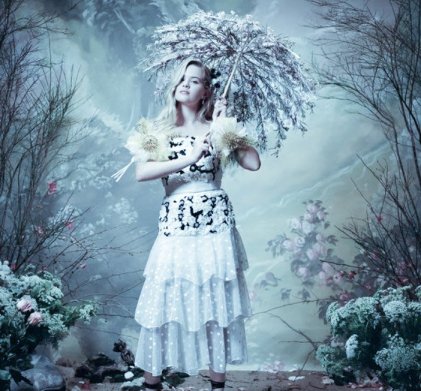
~ daffodils, that come before the swallow dares, and take the winds of March with beauty; violets, dim, but sweeter than the lids of Juno’s eyes ~
The Winter’s Tale was written in 1611 and is one of the last plays, written near the end of Shakespeare’s career. Among his influences for this tale, Ovid’s Metamorphosis would be the most recognizable – from the invocation of gods, goddesses and the Delphian oracle to the spectacularly arbitrary loss-of-life and a transformative ending.
The play begins with King Leontes of Sicilia, who becomes insane with irrational jealousy over his wife, Queen Hermione. The entire court knows their beloved queen to be innocent. This court from the highest lords to the humblest servants, feel the injustice of the king’s accusations, though they can only whisper of his lunacy for fear of angering him further. Queen Hermione grapples with her own powers of speech: she is an eloquent and persuasive speaker, yet this very gift invites profound misfortune. King Leontes resembles other mad kings in Shakespeare: King Lear, for example, a play which also deals with themes of silence vs. speaking, as when Lear implores his daughter, Cordelia, to speak-up in defense of her love for him, but when she does speak, he trusts her even less. These mad kings are riddled with egotism, mistrust, irrationality and rage. Their accusations are outrageously misplaced, and their fears beget more fear, their thoughts mutate and become so clouded that no one else can penetrate the madness.
The queen is accused of treason, adultery and even a plot to murder. Her remarkable equanimity and rationality rely on the known capriciousness of the planets and on the protection of the gods.
… if powers divine
Behold our human actions – as they do-
I doubt not then but innocence shall make
False accusation blush, and tyranny
Tremble at patience. – 3.2.27-31
Hermione’s gift for eloquence would surpass any defense attorney, were she awarded one. Not only does she defend her own innocence but also that of Camillo and of King Polixenes. She openly admits to loving Polixenes but only to the extent that would become a queen and host, and furthermore obeyed the very command of Leontes himself. She recalls with superior fluency how Leontes urged her to speak and persuade his friend Polixenes to stay in Sicilia longer. Tongue-tied, our queen? Speak you. (1.2.27), were Leontes’s words. Yet this was the point at which the king became insanely jealous. Lamentably, Hermione’s stunning poise cannot save her from her husband’s twisted law. Not even the proclamation of the Delphian oracle can sway a mad king’s will.
It is the season of winter, and before she is accused, Hermione plays with her son Mamillius, her little prince, and asks him to tell her a tale. He decides to tell her a sad tale.
A sad tale’s best for winter. I have one
Of sprites and goblins. – (2.1.27)
The boy’s short lines, these few words, are startling, as they portend the tragedy that strikes his family. Leontes disregards the oracle’s avowal of Hermione’s innocence. It is universally known that any word from the Delphian oracle is a direct communication from the God Apollo, and so the tragedy that strikes Leontes’s son, Mamillius, was not surprising to the realm, but vastly devastating.
Personified Time introduces Act 4 as the Chorus singing its diegesis. As if the shift from extreme heartbreak in winter to the hope of spring, sixteen years later, needs a comforting preamble; Time helps us imagine the baby girl, who was cast away by a raging king, blossoming into a beautiful young woman of sixteen – raised a shepherd’s daughter, in faraway Bohemia. Thus, Hermione’s daughter, Perdita, becomes a gentle shepherdess living in a pastoral environment. The setting is biblical with its rolling hills and flocks of sheep watched after by a benevolent shepherd, Perdita’s rescuer. Such a contrast to the violent world she was born into; and yet, a part of Hermione has been preserved through her daughter. Act 4 is full of spring, festivals, masquerade, disguise and new love. The love story of Florizel, a prince, and Perdita, a princess who is only known as a humble shepardess, contains elevated language, pastoral delight and interminglings of identity. Their dialogue is a mixture of romance, flirtation and noble devotion, as when Florizel praises Perdita at the Sheep Shearing Festival:
*What you do
Still betters what is done. When you speak, sweet,
I’d have you do it ever…
Each your doing,
So singular in each particular,
Crowns what you are doing in the present deeds,
That all your acts are queens.
Like Proserpina, of the Roman myth, Perdita was violently separated from her mother: Proserpina by abduction and Perdita by banishment, which was thought to be death. Shakespeare seems to group them together when Perdita conjures the spirit of the child-goddess who knew the names of all the flowers in her realm. Similarly, Perdita knows all varieties of flowers by name, as she is the host of the Festival. Many of Shakespeare’s heroines were knowledgeable in flowers and herbs. Ophelia, for instance, could identify herbs, in particular, and could tell their meanings and their magical or medicinal uses. This, however, was one more brand against Ophelia and her sanity. By contrast, with Perdita, her flower-poetry gives her more enchantment.
Handing out rosemary to King Polixenes and Lord Camillo, she says:
For you there’s rosemary and rue… these keep
Seeming and savour all the winter long.
Grace and remembrance be to you both… (4.4.74-47)
Implying, without really knowing, that someone or something needs to be remembered of winter. To which, Polixenes further implies when he speaks of art and nature – that marrying and mixing nobility with a baser stock would be disgraceful. He may even have called her a bastard. But Perdita then gives the king more flowers:
Hot lavender, mints, savory, marjoram,
Marigold that goes to bed with the sun,
And with him rises weeping. These are flowers
Of middle summer, and I think they are given
To men of middle age. (4.4.104-108)
Thereby putting Polixenes in his place and putting an end to any discussion of people who marry only because of their royal birth or lack thereof. Still, the king’s disapproval of his son’s engagement to Perdita sends the lovers fleeing.
Florizel and Perdita’s sudden appearance in Sicilia could not be more timely. King Leontes, now many years repentant in his guilt and sorrow, is nostalgic enough to be Florizel’s advocate. The king has changed. He is vulnerable and therefore eager for any show of love and forgiveness. He is open to the improbable, as is the reader, having felt all of the grief and suffering of this family. Shakespeare gives Perdita the power to verbalize, in one word, our feelings about Hermione’s unfair fate: “Alas”, is her single utterance, thereby unleashing the collective sorrow entirely.
Queen Hermione has the last word in an improbable reuniting, while her friend and savior, Paulina, has provided the creative force, the feminine direction for this final, spectacular denouement. In one sense, sixteen years would be a long season of transformation, in which Hermione could return as a rare beauty – recreated as a supernatural specimen of nature. Much happiness would bubble-up on the stage as a result; still, the terrible loss of life – and of years and the irreversible damage makes this a real tragedy, though it has been catalogued a tragicomedy.
*(4.135-137…143-146)















